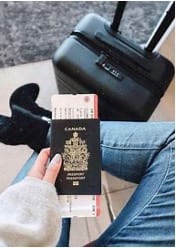Pack for a Semester in One Bag. Here’s How.


You’re studying abroad! For me, my study abroad experience was my first time leaving the country. I had many questions on my mind: how to best travel on a budget, how to deal with homesickness, how to apply for scholarships or insurance abroad, how to get around in a foreign country, and so many more. If you are like me, you may have a similar abundance of questions. However, packing your suitcase should be the last problem on your mind, so below I have listed the essentials that I packed and provided a few tips along the way.
How to Pack for Study Abroad
Strategizing how to pack a semester into two suitcases is daunting, especially if you do not know what is waiting for you on the other end of your flight.
Remember!
For most study abroad programs, you are packing for an entire semester, which is different than packing for a vacation – you will be adjusting to your new temporary home for several months. This means you will need things for school, your bedroom, and so much more, but packing everything you use will be unnecessary since you will most likely have limited space for packing.
Luggage
All airlines differ, so make sure to double check the baggage requirements for your airline. Even if your airline allows two checked bags and a carry-on, I recommend only taking one checked bag – which yes, it is possible, I’ve done it! I witnessed many fellow students struggle to transport multiple checked bags, whether that was putting it on the buses or just walking through the airports. In addition, while abroad you will most definitely find souvenirs and gifts you want to bring back, so having extra room on your return flight is recommended.
You will also get a carry-on bag, and I recommend using a backpack. They are great for daily use and can be used as a smaller bag to pack things in for traveling on the weekends.

Packing Important Documents
Important documents to have with you before you leave for study abroad include confirmation of enrollment, information about check-in for the university or housing accommodations. Having your passport and student visa is a must – always have an accessible copy of your student visa (print or digital) with you while traveling because you will be asked to show proof of your visa on several occasions! In addition, make sure to pack a copy of your study abroad insurance certificate and have access to the insurance company details.
Things to Prepare Digitally
Prior to studying abroad, I read up on phone plans in New Zealand and decided that the best option for me was to get a new sims card when I got to Auckland, and then download “WhatsApp” to communicate with my friends and family back home. In addition to “WhatsApp,” I made sure to download the “Currency Converter” app as well, which just made it easier to keep track of my spending.
In addition, I found it important to have digital document backups. I emailed or scanned important documents (such as my passport photo, insurance, important contact information/addresses, and letter of acceptance) to myself and saved them to a web-based email address just in case I ever needed to show this information and did not have my hardcopy. One thing I considered when choosing where to study abroad was the language barrier. For some destinations, it would be beneficial to have language apps/dictionaries!

Clothing and Other Necessities
Adapters and Charges – when going to a foreign country, check the plug type and because you will most likely need a plug with a different voltage to plug anything in. You can easily purchase an adaptor on amazon. Because of the different voltage levels, I recommend not bringing certain electronics, such as flatirons and hair dryers because they will mostly fry if you use them abroad.
Medications – Important! It is important to pack enough prescription medicine and first aid medicine for the time you are abroad. It is better to be safe than sorry and going to a doctor abroad could be expensive or confusing, so I recommend preparing any medications prior to leaving for studying abroad.
Money and Debit/Credit Card – Make sure to exchange some local currency for your abroad country’s currency before you leave – but do not bring too much cash. I met with my bank to discuss getting a credit card that most places abroad accepted, but do not be surprised when stores, especially small or local cafes, only accept cash.
Camera – nowadays phones double as excellent cameras. However, if you are into photography and want to capture some outstanding photos – especially sunset/sunrise pictures, photos in the dark, or fast pictures – it may be a good idea to bring a small camera.
Clothes – consider the climate – Research the typical climate for where you will be staying. New Zealand has the opposite season of the United States – so if you go to New Zealand in July, it will be winter there. However, in Auckland specifically, it does not snow, but it rains a lot – so rain boots, a raincoat, or umbrella are necessities!! (but you can easily get an umbrella abroad too if that is easier). In addition, if you decide to visit the South Island of New Zealand, their winters are much colder, and you will need a winter jacket and most likely some boots.

If you are thinking about spending more time in rural areas and in nature, you should pack more conservatively – high heels would not be very essential. Whatever the weather, if you are interested in taking advantage of the endless outdoor adventures in New Zealand, hiking boots (or walking shoes) are a must. A former study abroad student recommended that I bring a sleeping bag for overnight hikes. I loved that I brought a sleeping bag and partook in overnight hikes, but that might not be for everyone.
In addition, whether in New Zealand or Australia, it is rare you are far from the beach. I recommend packing a swimsuit (or two) and flip flops, or as New Zealander’s would call them, jandals.
Bedding and towels – check with your study abroad organization/destination, but the University of Auckland provided all bedding and towels.
Elizabeth T. | Criminal Justice major | Saint Joseph’s University | IFSA University of Auckland Partnership | Spring 2019